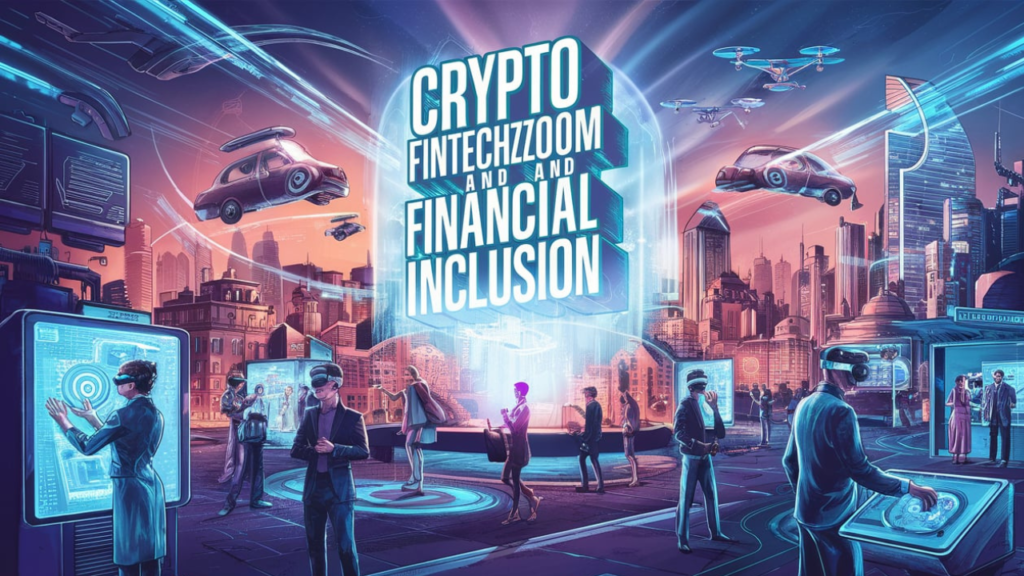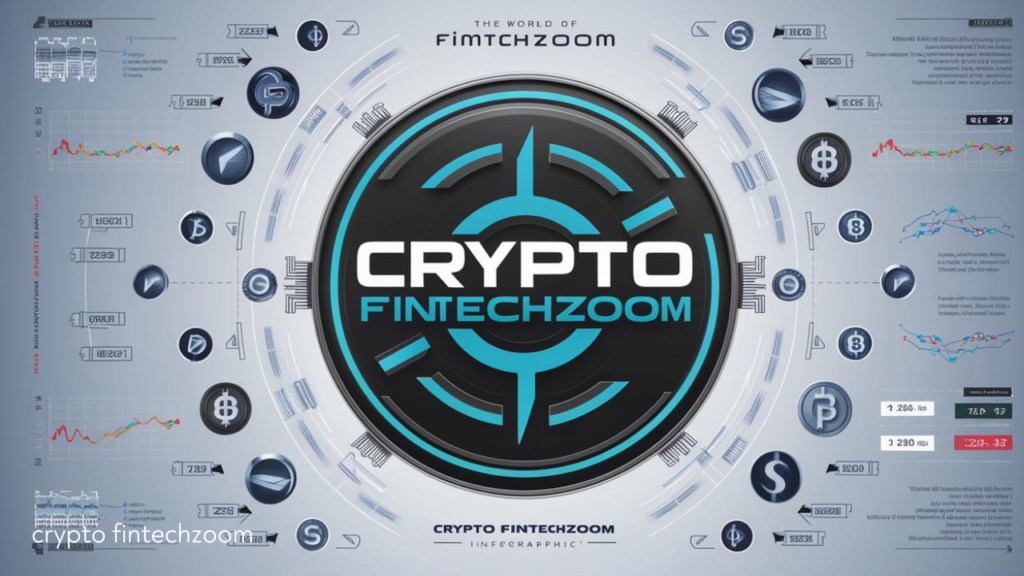Welcome to the fascinating intersection of cryptocurrency and fintech, often referred to as Crypto FintechZoom. This emerging field is transforming the way we think about money, investments, and financial services. Whether you’re a seasoned investor or just curious about the latest trends, this comprehensive guide will help you navigate the complexities of this exciting domain. We’ll delve into key concepts, explore the latest technologies, and provide insights into the future of Crypto FintechZoom.
What is Crypto FintechZoom?
Defining Cryptocurrency
Cryptocurrency, often called crypto, is a digital or virtual currency that uses cryptography for security. Unlike traditional currencies issued by governments, cryptocurrencies operate on decentralized networks based on blockchain technology. Bitcoin, created by an anonymous entity known as Satoshi Nakamoto, was the first cryptocurrency, paving the way for a myriad of other digital currencies.
Understanding Fintech
Fintech, short for financial technology, refers to innovative technologies that improve and automate the delivery and use of financial services. It encompasses everything from mobile banking and online lending to blockchain and cryptocurrency. Fintech aims to streamline and democratize financial services, making them more accessible to a broader audience.
The Intersection of Crypto and Fintech
Crypto FintechZoom represents the convergence of cryptocurrency and fintech, combining the decentralized nature of digital currencies with the technological advancements of financial technology to create new financial products and services. This synergy is revolutionizing traditional financial systems, offering more efficient, secure, and inclusive financial solutions.
The Evolution of Crypto FintechZoom
Early Days of Cryptocurrency
The journey of cryptocurrency began with the introduction of Bitcoin in 2009. Bitcoin’s creation marked a significant milestone in the financial world, introducing the concept of decentralized digital currency. Following Bitcoin, numerous alternative cryptocurrencies, known as altcoins, emerged, each with unique features and use cases.
Rise of Fintech
Fintech has evolved rapidly over the past decade. The rise of digital payments revolutionized transactions, making it easier for people to pay for goods and services online. Online lending platforms emerged, providing individuals and businesses with alternative ways to access credit. Fintech innovations have significantly enhanced the efficiency and accessibility of financial services.
Merging Paths
The paths of crypto and fintech began to merge with the advent of Initial Coin Offerings (ICOs), where fintech companies used blockchain technology to raise funds. Decentralized finance (DeFi) platforms emerged, offering financial services such as lending, borrowing, and trading without traditional intermediaries. This convergence has created a dynamic ecosystem of Crypto FintechZoom, driving innovation and growth.
Key Technologies Driving Crypto FintechZoom
Blockchain Technology
Blockchain is the backbone of cryptocurrency, providing a secure, transparent, and immutable ledger of transactions. It enables peer-to-peer transactions without the need for intermediaries. Each block in the blockchain contains a list of transactions, and these blocks are linked together in a chain, ensuring the integrity and security of the data.
Smart Contracts
Smart contracts are self-executing contracts with the terms of the agreement directly written into code. They automatically execute transactions when predefined conditions are met, eliminating the need for intermediaries and reducing the risk of fraud. Smart contracts are a fundamental component of decentralized applications (dApps) and DeFi platforms.
Artificial Intelligence and Machine Learning
AI and machine learning are used to analyze vast amounts of data, predict market trends, and enhance security in fintech applications. These technologies enable automated decision-making, personalized financial services, and advanced fraud detection. In Crypto FintechZoom, AI and machine learning play a crucial role in trading algorithms, risk assessment, and customer service.

Benefits of Crypto FintechZoom
Decentralization
By removing intermediaries, Crypto FintechZoom offers more direct and efficient financial services, reducing costs and increasing transparency. Decentralization also enhances security by eliminating single points of failure, making the system more resilient to attacks.
Financial Inclusion
Crypto FintechZoom can provide financial services to underserved populations, offering access to banking, loans, and investments to those without traditional bank accounts. Blockchain-based solutions can reduce the cost of financial services, making them more accessible to people in developing countries.
Enhanced Security
Cryptographic techniques and blockchain technology provide robust security measures, protecting transactions from fraud and hacking. The decentralized nature of blockchain also makes it difficult for malicious actors to alter or manipulate data, ensuring the integrity and trustworthiness of financial transactions.
Challenges in the Crypto FintechZoom Space
Regulatory Uncertainty
Governments around the world are still grappling with how to regulate cryptocurrencies and fintech innovations, leading to a fragmented regulatory environment. Regulatory uncertainty can hinder the growth of the industry and create challenges for companies operating in the Crypto FintechZoom space.
Security Risks
Despite strong security measures, the crypto space is still vulnerable to hacking, phishing attacks, and fraud. High-profile security breaches, such as the Mt. Gox hack, highlight the importance of robust security practices and continuous vigilance.
Volatility
Cryptocurrencies are known for their price volatility, which can pose risks for investors and limit their use as a stable medium of exchange. Market fluctuations can lead to significant gains or losses, making it essential for investors to adopt strategies for managing risk.

Popular Cryptocurrencies in Fintech
Bitcoin (BTC)
The original and most widely recognized cryptocurrency, Bitcoin, is often seen as digital gold and a store of value. Its decentralized nature and limited supply make it an attractive investment for those seeking an alternative to traditional assets.
Ethereum (ETH)
Ethereum introduced smart contracts, enabling the development of decentralized applications (dApps) and paving the way for DeFi. Ethereum’s blockchain supports a wide range of applications, from finance to gaming, making it a versatile platform for innovation.
Ripple (XRP)
Ripple focuses on enabling fast, low-cost international payments, partnering with financial institutions worldwide. Its consensus algorithm allows for quicker transaction times and lower fees compared to traditional banking systems.
Litecoin (LTC)
Often referred to as the silver to Bitcoin’s gold, Litecoin offers faster transaction times and a different hashing algorithm. Litecoin’s improvements on Bitcoin’s technology make it a popular choice for smaller transactions and everyday use.
Major Fintech Innovations
Digital Wallets
Digital wallets like PayPal, Apple Pay, and Google Wallet allow users to store and manage their finances digitally, making payments and transfers seamless. These wallets offer convenience, security, and integration with various financial services, simplifying the user experience.
Peer-to-Peer Lending
Platforms like LendingClub and Prosper connect borrowers with investors, bypassing traditional banks and offering competitive interest rates. Peer-to-peer lending democratizes access to credit and provides new investment opportunities for individuals.
Robo-Advisors
Robo-advisors like Betterment and Wealthfront use algorithms to provide automated investment advice, making investing more accessible and affordable. These platforms offer personalized investment strategies based on users’ risk tolerance and financial goals.
Insurtech
Innovations in insurance technology, or insurtech, include digital platforms for purchasing insurance, AI-driven claims processing, and personalized policies. Insurtech is transforming the insurance industry by improving efficiency, customer experience, and risk assessment.
The Role of Crypto Exchanges
Centralized Exchanges
Centralized exchanges (CEXs) like Coinbase and Binance act as intermediaries, facilitating the buying and selling of cryptocurrencies. They offer user-friendly interfaces, high liquidity, and additional services such as staking and lending. However, they also require users to trust the exchange with their funds.
Decentralized Exchanges
Decentralized exchanges (DEXs) like Uniswap and SushiSwap operate without a central authority, allowing peer-to-peer trading directly from users’ wallets. DEXs offer greater control over assets, enhanced privacy, and reduced risk of hacking. However, they may have lower liquidity and higher complexity compared to CEXs.
Hybrid Exchanges
Hybrid exchanges combine features of both CEXs and DEXs, aiming to offer the security and user control of DEXs with the liquidity and convenience of CEXs. These exchanges provide a balance between decentralization and usability, catering to a broader range of users.
The Future of Crypto FintechZoom
Increased Adoption
As cryptocurrencies and fintech solutions become more mainstream, we can expect increased adoption by individuals, businesses, and financial institutions. This trend will drive further innovation and integration of crypto and fintech into everyday financial activities.
Regulatory Clarity
Governments and regulatory bodies are likely to develop clearer frameworks for cryptocurrencies and fintech, promoting stability and growth in the sector. Regulatory clarity will provide a more predictable environment for businesses and investors, fostering confidence and investment.
Technological Advancements
Ongoing advancements in blockchain, AI, and other technologies will continue to drive innovation, creating new opportunities and challenges in Crypto FintechZoom. Future developments may include more scalable blockchain solutions, advanced AI applications, and new financial products and services.
Investing in Crypto FintechZoom
Strategies for Investing
- Diversification: Spread your investments across different cryptocurrencies and fintech stocks to mitigate risk. Diversification helps balance potential gains and losses, reducing the impact of any single asset’s performance.
- Research: Stay informed about the latest developments, trends, and technologies in the sector. Thorough research enables you to make informed decisions and identify promising investment opportunities.
- Risk Management: Be aware of the volatility and potential risks associated with crypto investments, and invest only what you can afford to lose. Implementing risk management strategies, such as stop-loss orders and portfolio rebalancing, can help protect your investments.
Common Pitfalls to Avoid
- Lack of Research: Investing in hype without understanding the underlying technology and market dynamics can lead to poor investment decisions. Always conduct thorough research before investing in any cryptocurrency or fintech product.
- Emotional Trading: Making impulsive decisions based on market fluctuations rather than a well-thought-out strategy can result in significant losses. Stick to your investment plan and avoid reacting to short-term market movements.
- Security Lapses: Failing to secure your digital assets properly can lead to potential losses from hacking or phishing attacks. Use secure wallets, enable two-factor authentication, and stay informed about security best practices.
Case Studies in Crypto FintechZoom
Successful Implementations
- DeFi Platforms: Platforms like Aave and Compound have revolutionized lending and borrowing by enabling users to lend and borrow digital assets without intermediaries. These platforms offer competitive interest rates, transparency, and accessibility, attracting a growing user base.
- Crypto Payment Solutions: Companies like BitPay facilitate cryptocurrency payments for merchants, allowing them to accept digital currencies alongside traditional payment methods. This integration enhances payment flexibility and expands the customer base for merchants.
Lessons Learned
- Mt. Gox Hack: The infamous Mt. Gox hack in 2014 resulted in the loss of approximately 850,000 bitcoins, highlighting the importance of robust security measures. The incident underscored the need for exchanges to implement strong security protocols and for users to store their assets in secure wallets.
- Regulatory Challenges: Ripple’s ongoing legal battle with the SEC over whether XRP is a security emphasizes the importance of regulatory clarity. The case highlights the need for clear and consistent regulations to ensure the stability and growth of the crypto industry.

Crypto FintechZoom and Financial Inclusion
Bridging the Gap
Crypto FintechZoom has the potential to bridge the gap between the unbanked and traditional financial services, offering innovative solutions for financial inclusion. Blockchain-based platforms can provide secure, affordable, and accessible financial services to underserved populations.
Real-World Applications
- Microloans: Blockchain-based platforms can facilitate microloans to individuals in developing countries, providing them with the capital needed to start or grow small businesses. These platforms offer transparent and efficient lending processes, reducing the barriers to accessing credit.
- Remittances: Crypto FintechZoom can significantly reduce the cost and time associated with international money transfers, benefiting migrant workers and their families. Blockchain-based remittance services offer faster, cheaper, and more secure alternatives to traditional money transfer services.
Security Best Practices in Crypto FintechZoom
Protecting Your Assets
- Use Hardware Wallets: Store your cryptocurrencies in hardware wallets for enhanced security. Hardware wallets keep your private keys offline, reducing the risk of hacking.
- Enable Two-Factor Authentication: Add an extra layer of security to your accounts by enabling two-factor authentication (2FA). 2FA requires a second verification step, making it more difficult for unauthorized users to access your accounts.
- Stay Informed: Keep up with the latest security threats and best practices. Regularly update your software and stay informed about potential vulnerabilities and how to mitigate them.
Avoiding Scams
- Phishing Attacks: Be cautious of emails or messages requesting sensitive information. Always verify the source before providing any personal or financial information.
- Ponzi Schemes: Be wary of investment opportunities that promise guaranteed high returns with little risk. These schemes often rely on new investors to pay returns to earlier investors and eventually collapse.
- Fake ICOs: Research thoroughly before investing in new projects or tokens. Verify the legitimacy of the project, the team behind it, and its whitepaper to avoid falling victim to fraudulent ICOs.
The Role of Education in Crypto FintechZoom
Importance of Knowledge
Education is crucial for navigating the complexities of Crypto FintechZoom, empowering individuals to make informed decisions and avoid potential pitfalls. Understanding the technology, market dynamics, and regulatory environment is essential for success in this space.
Resources for Learning
- Online Courses: Platforms like Coursera and Udemy offer courses on cryptocurrency and fintech. These courses cover a range of topics, from blockchain basics to advanced trading strategies, providing valuable knowledge for beginners and experienced individuals alike.
- Books and Publications: Stay updated with the latest books, whitepapers, and industry reports. Reading industry literature helps you stay informed about the latest trends, technologies, and developments in the Crypto FintechZoom space.
- Communities and Forums: Join online communities like Reddit and Bitcointalk to engage with experts and enthusiasts. These communities offer a wealth of information, support, and networking opportunities, helping you stay connected and informed.
Conclusion
Crypto FintechZoom represents a dynamic and rapidly evolving intersection of cryptocurrency and financial technology. From decentralized finance to blockchain-based payment solutions, the innovations in this space are reshaping the financial landscape. While the journey comes with its challenges, including regulatory uncertainties and security risks, the potential benefits of decentralization, financial inclusion, and technological advancements are immense. As we look to the future, staying informed, adopting best practices, and embracing the transformative power of Crypto FintechZoom will be key to navigating this exciting frontier.
FAQs
What is Crypto FintechZoom?
Crypto FintechZoom refers to the convergence of cryptocurrency and financial technology, combining blockchain and fintech innovations to create new financial products and services.
How does blockchain technology impact fintech?
Blockchain technology provides a secure, transparent, and decentralized ledger for transactions, enhancing the efficiency and security of fintech applications.
What are the benefits of decentralized finance (DeFi)?
DeFi offers financial services without intermediaries, reducing costs, increasing accessibility, and providing new opportunities for financial inclusion.
What are the risks associated with investing in cryptocurrencies?
Investing in cryptocurrencies involves risks such as market volatility, regulatory uncertainty, and security vulnerabilities. It’s important to conduct thorough research and adopt best practices for security.
How can I protect my cryptocurrency assets?
Protect your assets by using hardware wallets, enabling two-factor authentication, staying informed about security threats, and avoiding scams like phishing attacks and Ponzi schemes.




